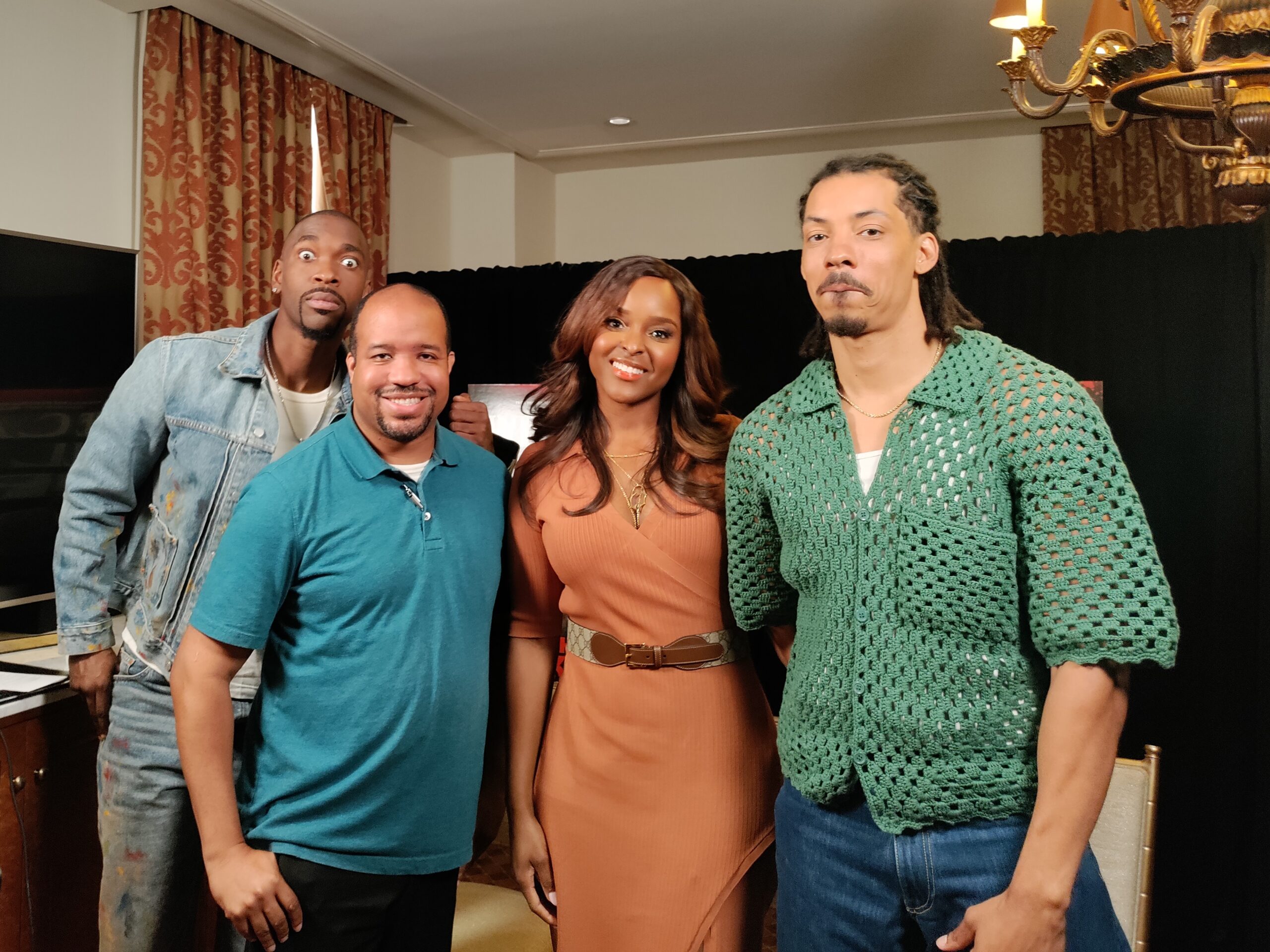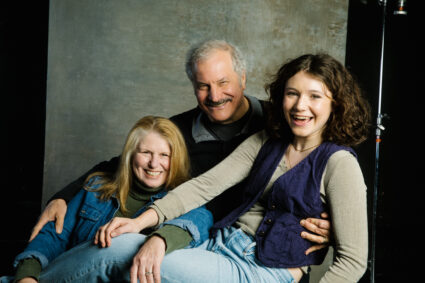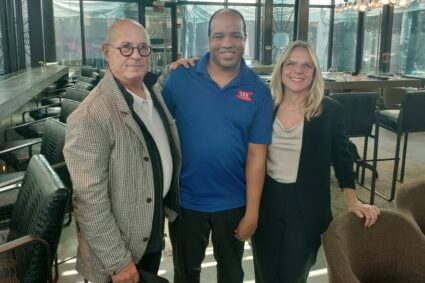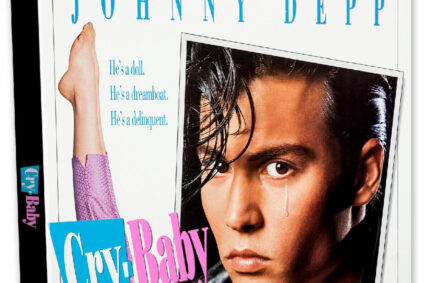
(Dean with the cast of The Blackening: Jay Pharoah, Antoinette Robertson and Melvin Gregg)
DMV, get ready for a horror comedy unlike no other this weekend. On this edition of THE INTERVUE, I recently sat down with the cast of the new Tim Story film “The Blackening”. The movies centers around a group of Black friends who reunite for a Juneteenth weekend getaway only to find themselves trapped in a remote cabin with a twisted killer. Forced to play by his rules, the friends soon realize this ain’t no motherf****** game. The Blackening skewers genre tropes and poses the sardonic question: if the entire cast of a horror movie is Black, who dies first?
Here to talk with me about the new movie are three of its cast members: Jay Pharoah, Antoinette Robertson & Melvin Gregg.
So my first question to all three of you is what drew you to “The Blackening”?
Melvin Gregg “King” (MG): I wasn’t doing anything else. And it was like “you want to do this movie?” And I said “Shiiit, why not?” I say, I read the script. I’m kidding, they did not just say “you want to do this movie”. I had audition. it was it was cool. The script was funny. I felt like it was it was culturally accurate. You know, the characters were very fleshed out. It’s like an approach to the horror genre, different from all of the horror films I saw before. So, I felt like it would be something fresh, and it could potentially be lightning in a bottle.
Antoinette Robertson “Lisa” (AR): I would say I mean, also, I mean, the script was just, it was just really well written. But what I realized is like, there’s so much of horror that when it’s centered around black people, it has a lot to do with trauma. And I just wasn’t interested in doing black trauma porn, if that makes sense. Because the world we see negative images and brutal images, and people harming black bodies, in real life. And so that’s I wasn’t interested in anything like that. But then when I read the script, I was like, “Okay, this is a really great take on an experience that I feel like we’ve never seen.”
I just feel like I’ve never ever seen a character in a theater, do the things that we all do in this film, as accurately as we do. Like, it just felt really authentic. I feel like they had their finger on the pulse of like that the comedy/horror balance. They made sure that the moments that you know, the moments of gravity were really felt so that people understood that the stakes were real, so that the comedy could soar. And I just thought it was beautifully written. And then I heard we were going to be a part of it with I was like, “okay, Sign me up!”
Jay Pharoah “Shawn” (JP): I enjoyed the breaking down of monoliths that were in the film and the fact that you see all different types of black people represented on screen, something that you haven’t seen before. And at the end of the movie, well, I’m asked for more, but what brought me to it was that a fresh innovative idea that could possibly be a classic, like Melvin was saying lightning in the bottle. And, of course, the multitude of talent that we had in the cast. And the previous relationships with Tim Story, of course, was Sinqua Walls, putting my bro in another movie.
You know, it just seemed like a slam dunk, bro. So and I think this movie is going to be modeled after for years because breaking that this has never been done before type. It’s like now people people’s minds are more open like, “well, we can do this. We can do that. We can do this. Like yeah, we can all do it.” I mean, listen to Filipinos were doing it. They were doing it on Netflix. I’ve seen like, ten Filipino horror films and their fire like I’m like, “dope”. So it’s about time that we’ve gotten together and come up with something like this. And it’s like, it should have happened years ago but now what’s happening now and we’re all part of this special project.
I’m gonna continue with you, Jay. This is this third time you’ve worked with Tim Story since you’ve worked with him in “Ride Along” & “White Famous” and you told us that “it was a balance of horror and comedy that drew you in.” How do you find the balance of horror and comedy in a horror film?
JP: It’s just all about being in the character and being present in the moment at the time. Like if it’s the same where y’all just kick it & y’all just talking shit, get in there and talk shit. If it’s a scene where you’re supposed to be horrified and you got a man shooting arrows at you, be scared as hell, this dude is 6’6” and he’s running after you. It’s just all about being present. So you balance it by just by just cementing yourself in the character.
Antoinette, you mentioned that when it comes to playing a terrified character, it’s not that hard to do. Can you emphasize?
I am a little bit of a ‘fraidy cat when it comes to certain things. My imagination is a little too vivid. I’m a little bit of an empath. So being terrified is not a very difficult thing for me, because my mind can go really wild, like I can convince myself of a lot. It’s actually it’s probably not healthy. So, it what’s interesting about it is like it kind of like I kind of consumes me for the time that we’re filming. I kind of really can’t think of anything else and then I kind of get lost in a world. And the second we’re done, it’s completely gone. But while we’re in it, I create that world. So, if I’m running and I’m screaming, legitimately, I’ve already created a world where it really is life or death for me.
Melvin, you said that “playing a comedy and a horror film is where you play with so much urgency and so much pain I feel like a lot of comedy just comes from its honest moments.” What are some of those honest moments for you when it comes to The Blackening?
All of them. So basically, what “The Blackening” all at a comedy comes from the honesty in those moments, whereas your typical horror movie, people go left, and you scream at the screen, “go right!” But in this film, we go right. And given that someone on the cast may say, “Let’s go left” someone else on the cast, we’ll say, “let’s go right”. Therefore, the people in the audience will find relatability in that moment. And that’s where comedy comes from relatability. “Go right, go right. Yes. Good. You say go right.” That’s where the comedy comes from and the honesty, at the moment.
This question is for all three of you. Let’s talk about the importance of having so many black characters as Jay talked was months ago, this is a large, black ensemble cast. Talk to us about that importance, especially in a horror film and the horror genre for films in the future.
MG: A lot of times in horror movies, there’s only one of us and we’re dead early on. So, you really don’t get a chance to get to know that character. So, people who don’t have black friends, that’s their representation of black. And they don’t really get a good representation of a rounded character but in this film, there are multiple black people. In fact, there are all black people that last watched the movie, so you get a chance to get to know a variety, not all of them, but multiple.
So you get a chance to know a lot of different types of black people throughout the film. And black is not a monolith. So, you see all of the different black experiences all of the different experiences from different backgrounds and different people. And you understand that they’re all black, is now who’s the blackest with all black. And that’s that.
AR: Well, everybody doesn’t make it. Let’s say that, or maybe none of us make it you never know. What I want to say about you just like you’d be going off on tangents sometimes. And then my brain goes with you. And then I tried to like bring it on back. What’s interesting about having seven different characters, depicting different hues of blackness is that I feel like, just like, as Melvin said, “that’s never been depicted before. We’ve never seen that before.” You see all of these people trying to solve a problem trying to survive and they all have different ideas as to how to do it.
It’s ludicrous that you know, the game is making them quantify their blackness, which is something that does happen in real life. Also, sometimes through the scope of whiteness, and so when you see all of these characters react in completely different ways, and have different ideas, they have different backgrounds and all of these things but they have one commonality it’s just very interesting because again, it reiterates the fact that we’re not a monolith.
JP: Ditto
My last question is this says we all seen black tropes happening in horror & sci-fi films, what is one black trope that you will love to go away in future films.
AR: I want the tokenism. We’re just the best friend to disappear more than anything, because what you see with this film is there are seven fully fleshed out characters that none of them are the sidekick. Everyone has a main character. Everyone has a dynamic story arc. No one is just a supplementary character. So, I’d love to see the tokenism disappear, to be honest.
MG: Yeah, I second that. That token character a lot of times isn’t fleshed out. The only black person in a white world I feel like we need to dive into that character. What’s going on was in his head, like, what’s his fears was his insecurities but that’s a different story. I feel like if I’m going into a negative trope is the over the top like ghetto ratchet stuff. You can have bad shit because it’s real, it exists, but there should be a balance where there is that ratchet fan is also to calm friend who you know, “calm down”. You kind of got you have a dichotomy of ratchetness. You gotta balance. I feel like there should always be a balance and that just means cast more black people.
JP: I think to echo what Melvin said just having full representation on screen. It’s not just the ratchetness. it’s not just two black brothers that got into Harvard. They do have a friend that’s neighborhood, you know what I mean? So, I think it that, tokenism, not showing not showing one showing all because it’s 2023. We have definitely advanced and we’re all out here. Every single one of us out here. Yeah, they’ve just never talked about us. They want to they want to perpetuate one little stereotype. Everybody got a Glock nine. Not everybody got a Glock. I mean, not everybody got a Nina.
The Blackening scares its way into theatres June 16th (Juneteenth weekend) from LIONSGATE


